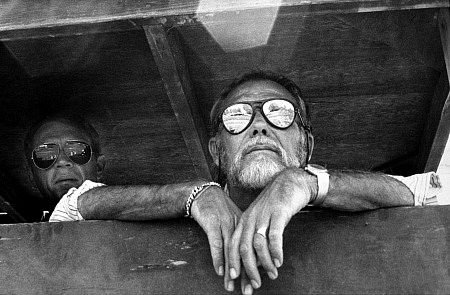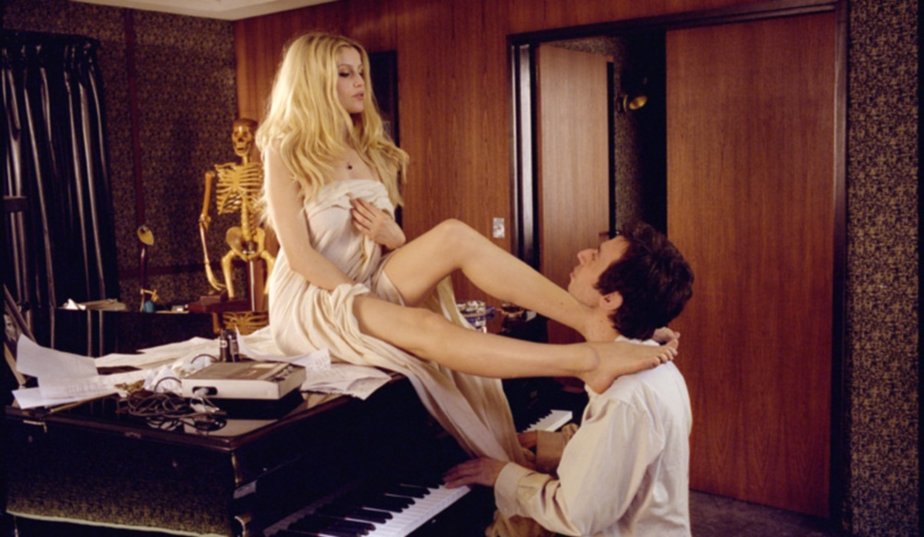Rectify Season 2, Episode 3 “Charlie Darwin”
Written by Coleman Herbert
Directed by Stephen Gyllenhaal
Airs Thursdays at 10pm ET on Sundance
Whether it be feelings, traumatic life events, or relationships that forever haunt us, there’s always forces we can’t see constantly trying to deform and reshape who we are as human beings. In fact, our strength of character is often defined by how well we can stand up to these forces, like a tree branch unwilling to fall, even in the strongest of storms. And as every character in Rectify finds themselves fighting against events and ideas almost completely out of their control, “Charlie Darwin” is a story of resilience, of keeping hope in these dark, modern times, where the definitions of everything in the world (right down to “bad” and “good”) have become curved like the instruments in the Holden family vehicle, slippery, hard-to-define shapes missing the definitive angles they may once have had.
Although this episode mostly deals with the fallout of Bobby Dean’s arrest, “Charlie Darwin” often speaks to the audience through Ted Jr., as he goes on one of the most dramatically boring adventures, trying to procure a loan to save the family business. Unable to gain any traction through smiling or grimacing, the only phrase Teddy seems to hear (like Daniel in a way) is “not now, but maybe later”. Unsatisfied with the status quo and the dismissal of his business-saving idea by his stepmother (who waves it away and says “whatever Ted says is fine, works for me”, her attention clearly on her biological son), Ted Jr. is a man increasingly frustrated with his position in life, one where a failing business (and marriage) and a stepbrother returning from the dead (ok, not literally) have trapped him in a downward spiral. When Ted Jr. sits alone at the golf course at the end of the episode, it’s not just a reference to his previous conversation with Daniel back in season one’s “Sexual Peeling”; it’s visual significance that Ted Jr. has lost touch with who he thought he was, as his desperate attempts to recapture his one true swing continuously fail, and he finds himself in the shadow of Daniel once again.
The point is not to focus on Ted’s futility: like Jon Stern’s conversation with Hollis, their failures are instigated by forces they just don’t understand. And that frustrating fight against the inevitable is, as males, often what we allow to define us: but where Ted Jr. and Jon can’t stop looking behind (Jon needs to know why Hollis lied to him, a completely meaningless activity), Daniel Holden is ready to look ahead. He may not be doing it in the most constructive fashion – even if he throws out everything from his childhood, he’ll never be able to erase what’s happened to him, his family, and a life he never got to lead – but he’s trying to take a step forward, giving Bobby Dean a free pass for beating him nearly to death, and attempting to be kind to Ted Jr., even after what he said to him last season (and of course, what Daniel did in return, which sent Ted Jr. into his current spiral).
In an hour full of dark moments, dimly lit hallways, and shared looks of fear (especially between Amantha and her mother), the optimism of “Charlie Darwin” (titled after a The Low Anthem song about the evils of capitalism) still finds ways to shine through in Daniel, who remains the beacon of hope at the center of the show, even as Rectify expands and makes characters like Stern and Daggett larger characters. His flashbacks show that he hasn’t quite taken that step forward yet – in it, he decides to start numbing himself with medication offered to him by a doctor – but in the present, “Charlie Darwin” shows that he’s at least willing to try, speeding down the highway in an attempt to remove that numbness in his center, slowly chipping away at the carefully-constructed walls he built for himself while in prison and it seemed there was no hope left.
After all, without hope, what chance would we have in this modern world?
– Randy




